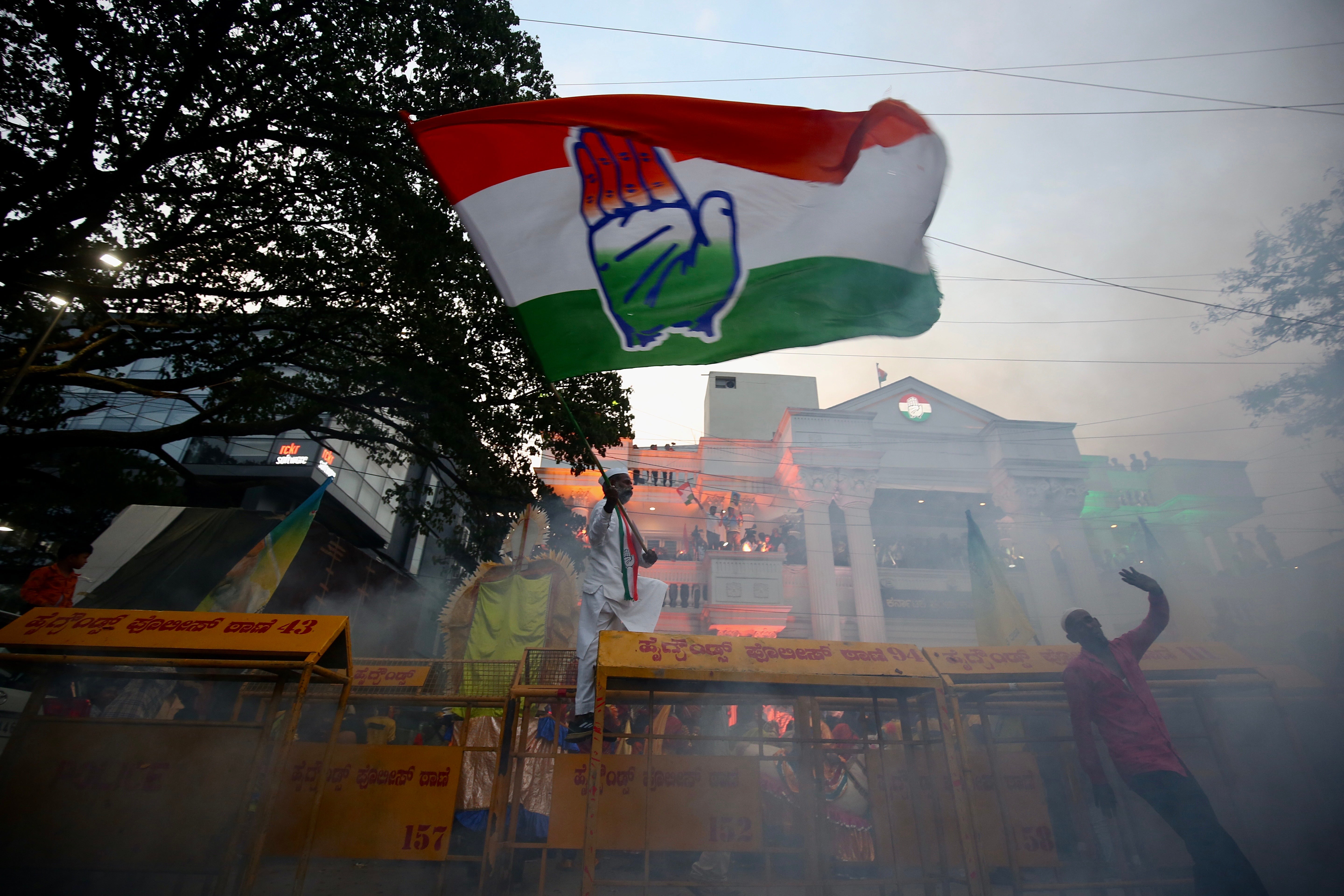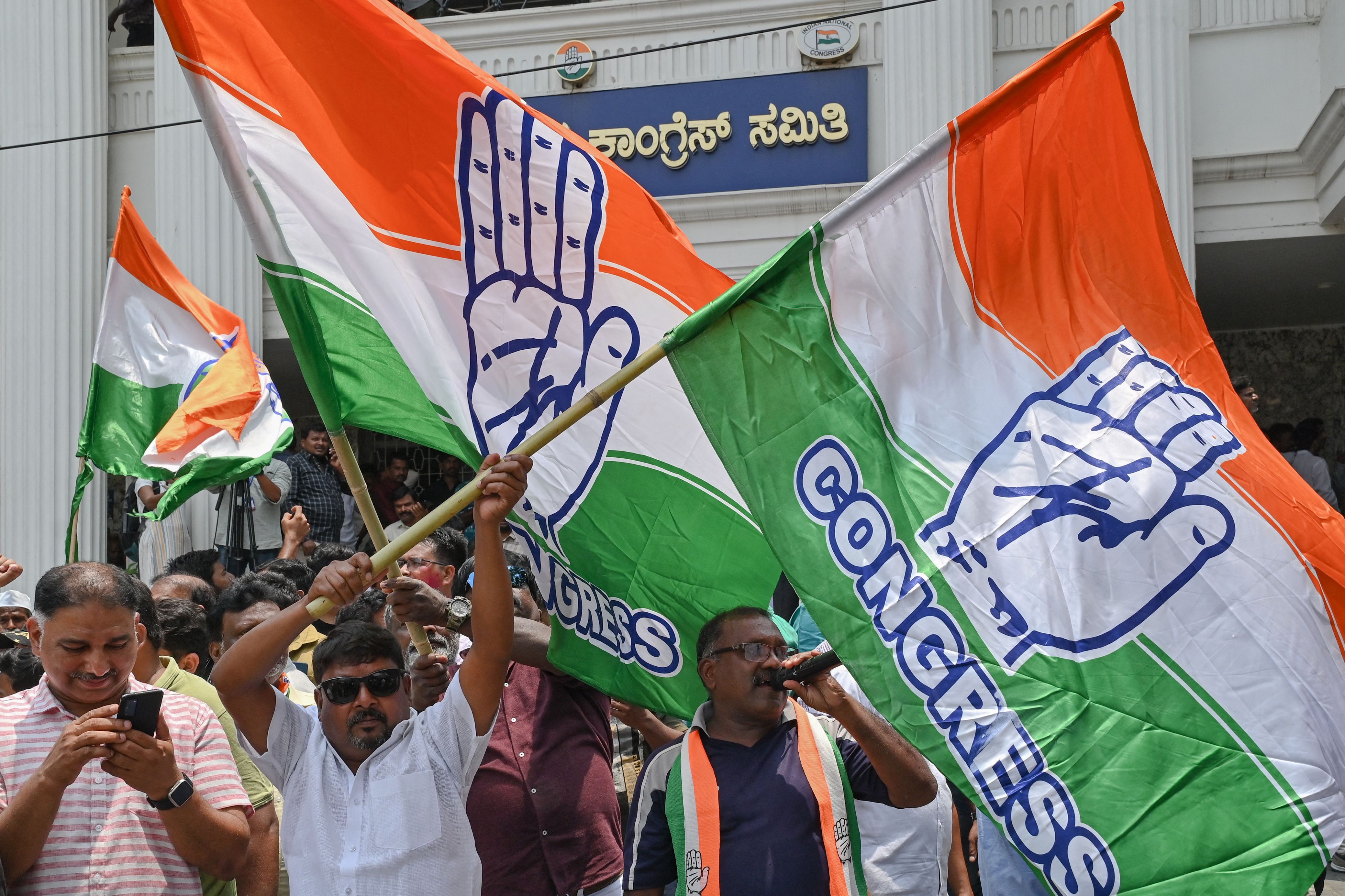Karnataka: Why Modi suffered ‘decisive’ poll defeat in key Indian state
BJP’s reliance on Narendra Modi for its campaign along with keeping a distance from state issues led to right-wing party losing the only southern state where it was in power

Narendra Modi’s ruling BJP received a massive drubbing at the Karnataka elections that has driven away his right-wing party from its only stronghold in southern India.
The electoral humiliation for India’s prime minister and his Hindu nationalist party has come a time when national elections just a year away will decide whether Mr Modi will get a shot at a third term ruling India.
Mr Modi’s rivals in the Congress party, led by the Gandhi family scion Rahul Gandhi, won by a landslide in the state that has not favoured incumbency for decades.
The Congress, known as the Grand Old Party as it ruled the country for decades, registered a stellar comeback in the southern state by winning 135 seats in the 224-seat strong state assembly, comfortably crossing the coveted halfway mark – and leaving Mr Modi’s party with a mere 66 seats.
The Congress broke into celebrations and distributed sweets in many parts of Karnataka as well as in Bengaluru city, the state capital and tech hub.
Rahul Gandhi, whose countrywide “Unite India” march has been credited by his party’s officials and workers, welcomed the Congress victory and said the party fought with “love”.
“I feel happiest about the fact that we didn’t fight this fight with hate or wrong words. We fought this fight with love, with an open heart, and the people of Karnataka showed that this country likes love,” he said.
Political analysts blamed the BJP for ignoring state issues and not having enough of a grassroot grip on the state, relying instead on Mr Modi’s charm and his party’s reliance on communal polarisation.
In the run up to the elections, the Hindu nationalist party’s local workers protested against teenage girls wearing the hijab to educational institutions. The prime minister’s campaign also had him claim opposition leaders personally abused him “91 times” in different ways.

The BJP’s members also stirred controversy by consistently castigating a historical freedom fighter from the state, Tipu Sultan, while the prime minister himself bizarrely conflated the Congress’s poll promise of banning a fringe right-wing outfit called the Bajrang Dal, with the holy Hindu chant “Jai Bajrang Bali”, used to evoke diety Hanuman.
A senior journalist described to The Independent why Mr Modi – who personally led the long-drawn-out, communally charged campaign that saw miles-long rallies – lost.
“In a stressed economy, where price rise is a quotidian concern, Hijab, Tipu Sultan, Bajrang Bali etc come across as tone deaf,” according to Bengaluru-based journalist Prem Panicker.
“As does a PM who is constantly talking of himself, and not of the people he supposedly represents.”
He added that Mr Modi’s party campaign at no point addressed, or even seemed to understand, local issues across the breadth of Karnataka, partly explaining why it was successful only in coastal Karnataka and Bengaluru Urban, where its message has some resonance.
Congress’s campaign and victory is in contrast to the BJP which put all its chips on Modi, Panicker said.
“And finally, a party in power asking for an encore on the grounds that Modi will deliver is cognitive dissonance of a high order – the average voter knows that Modi’s party was in power for over three years, so the logical question they ask is, ‘If you didn’t deliver then, why should we trust you again?’” questions Panicker.
Jairam Ramesh, an ex-federal minister and senior Congress leader, also said his party’s “decisive” win was the prime minister’s “decisive” loss.

“We did not make this a national election. Congress’s decisive win is the prime minister’s decisive loss. Because apart from the prime minister, there was no other face [from the BJP].”
BJP spokesperson Nalin Kohli, however, said each state poll would be different.
“...we won three states this year and going ahead there are five elections to come. Each of these states have different challenges and we cannot have a common strategy,” he said.
Mr Modi’s outgoing chief minister in Karnataka said the BJP will analyse and correct its mistakes for a comeback in the parliamentary elections.
“We accept the verdict of the people of Karnataka with due respect, we will take this verdict in our stride,” tweeted Basavaraj Bommai.
Rajeev Gowda, the Congress’s head of research and a federal lawmaker, held out hope that with each state victory for his party, the momentum for a national uprooting of the BJP would increase.
“This is an opportunity for Congress to enhance state efficiencies in Karnataka, build a new governance model and showcase that to the country,” said Prithvi Datta Chandra Shobhi, a political commentator who teaches at Krea University in southern India.

Panicker explains that the formula that worked for Congress was of having strong local leaders in ex-chief minister Siddaramaiah and the party’s key troubleshooter DK Shivkumar, in addition to having candidates of a local stature who wielded influence in their areas, and who were given a free hand to front their campaigns.
“In Mallikarjun Kharge, [the Congress’s national chief], they not only had a leader from the state, they also had a strong, focussed, war-time consigliere who could keep the flock together and have them all pulling in the same direction,” he said.
This freed up the Gandhi siblings, Rahul Gandhi and Priyanka Gandhi Vadra, to do their own thing, rather than forcing them to carry the entire burden of campaigning, he said.
“If the Congress studies the campaign, it has sufficient takeaways to be able to replicate in the elections to come,” the senior journalist said.
The Congress is set to emulate the learnings from its Karnataka triumph and adapt them for every poll-bound state this year as well as federal elections against Mr Modi’s Hindu nationalist fervour next year, said Milind Deora, a former federal minister from the Congress.
“Nothing is impossible in politics,” he said.
Join our commenting forum
Join thought-provoking conversations, follow other Independent readers and see their replies
Comments




Bookmark popover
Removed from bookmarks